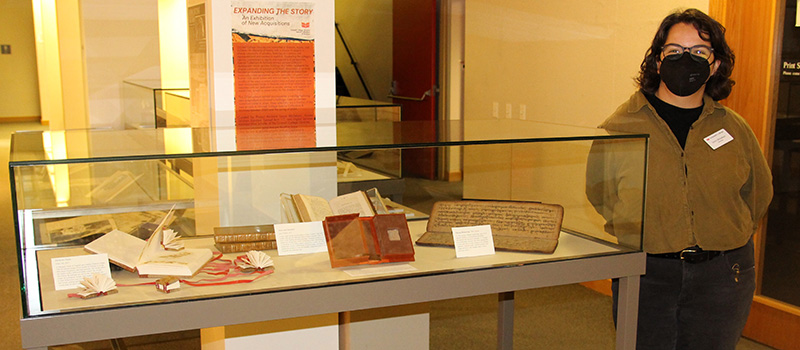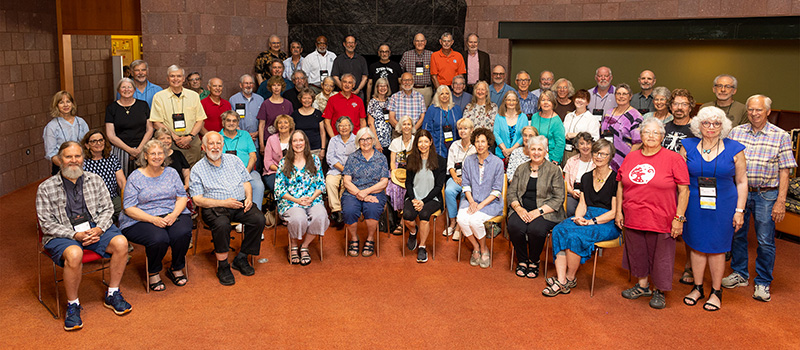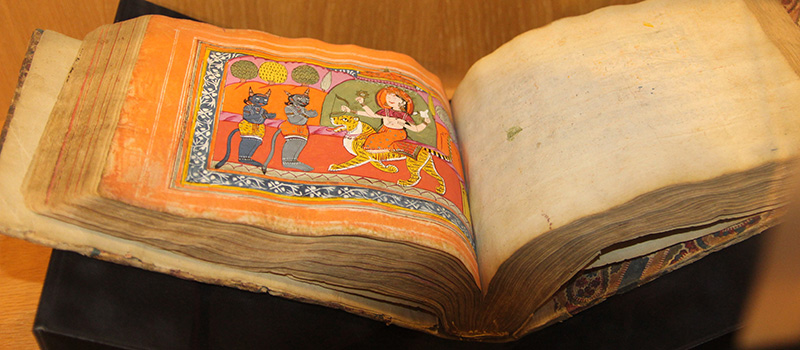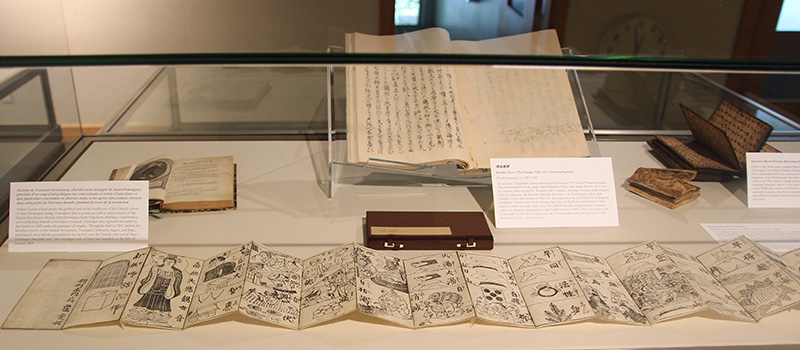Exhibit in Burling Library showcases new Special Collections acquisitions
September 17, 2024 — What does a first edition of Maya Angelou’s The Heart of a Women, a collection of 1905 Meskwaki Manuscripts, and a 1570 Torah scroll have in common?
They are all items acquired since 2020 by the Grinnell College Special Collections & Archives. The efforts in Special Collections are one of the central initiatives from the College Library’s strategic goals toward becoming more welcoming and inclusive.
“We are in a new era of collection,” says Project Archivist Laura Michelson. “Since 2020, we’ve added over 150 new items. A lot of that is more deliberate collecting.”
 Project Archivist Laura Michelson stands next to the Expanding the Story exhibit in the lowest level of Burling Library.
Project Archivist Laura Michelson stands next to the Expanding the Story exhibit in the lowest level of Burling Library.
As stewards of the College’s history, fostering an inclusive and representational environment is essential. Special Collections staff and Mark Christel, librarian of the College, have been focusing on broadening holdings with the additions of voices from historically underrepresented authors, examples of global book history, and social justice and activism topics.
“A lot of the acquisition thinking is about gaps we want to fill and diversifying materials,” Michelson says. “We realized we don’t have a lot of representation of different voices, so we purposely kept an eye on bookseller catalogs to add different perspectives. It ties well to the social justice happenings on campus and gives people a chance to reflect on what’s in special collections. For instance, there’s a section on non-Western manuscripts acquired this spring. We have examples of medieval and early modern European materials, but book culture is global. To add more is really exciting.”
To display a sampling of the newly acquired items, Michelson, Access Services Assistant Samuel Burt ’17, and Digital Services Assistant Max Schafer curated an exhibit called Expanding the Story. The exhibit went up in the lowest level of Burling Library right before Reunion 2024 and will remain up through September. Grinnellians can see it any time the library is open.
 For a 50th reunion class gift in 2023, the class of 1973 raised money for special collections. The funds assisted in the financing of new acquisitions.
For a 50th reunion class gift in 2023, the class of 1973 raised money for special collections. The funds assisted in the financing of new acquisitions.
Collection development for the recent acquisitions was supported by the library budget and donor support. In planning its 50th reunion in 2023, Christel worked with DAR and members of the class of 1973, who decided to raise money for special collections as a class gift. “As we discussed options, the idea of directing their giving to expand our holdings in social justice, diversity, and civil rights really resonated,” Christel says.
Michelson says it’s really exciting to see how Grinnellians continue to support learning at the College in new venues.
“I did a Virtual Alumni College class this spring and some alums from the class of 1973 attended the discussion,” she says. “They had not been to a special collections like we have today. The fact they are invested in this is exciting. I think it’s a great experience for immersive learning on campus.”
 This 1800 Mughal-Era manuscript came from North India. The gods Manasa, Durga, and Kali are dramatically depicted in vibrant orange, yellow, rose, and blue backgrounds.
This 1800 Mughal-Era manuscript came from North India. The gods Manasa, Durga, and Kali are dramatically depicted in vibrant orange, yellow, rose, and blue backgrounds.
Another donor gift, the Dr. Geraldine Beaty King ’58 Fund, enabled the Libraries to purchase a number of exquisite non-Western manuscripts. A group of faculty members evaluated a wide selection of manuscripts and gave feedback on which they could see incorporating into their coursework. Additions include an Ottoman text on Islamic law (Turkey, 1615), a Persian manuscript about Yusuf and Zulaikha (Central Asia, 1780), a Coptic text (Ethiopia, late 18th century), a manuscript Torah scroll (Syria, 1570), an elaborately illuminated Mughal Era manuscript (India, 1800), and a Buddhist text (Japan, 1666).
Michelson is looking forward to students seeing the exhibit now that they have returned to Grinnell for fall classes. Some of the acquisitions could spark student research projects. For instance, Michelson said they obtained a student photo album from around 1915. The cover has a red Grinnell College pennant and inside are hundreds of original photographs depicting idyllic scenes in the lives of farmers and students, homes set against the Iowa landscape, and young people driving buggies and studying on grassy fields.
“It’s definitely still a mystery whose scrapbook this was,” Michelson says. “A bookseller had it and approached us. It would be an exciting research project for students to determine its creator and their Grinnell story.”
 With a commitment to the development of a more global, diverse collection in mind, Special Collections acquired several manuscripts from around the world.
With a commitment to the development of a more global, diverse collection in mind, Special Collections acquired several manuscripts from around the world.
Other highlights of the exhibit include a 2000 BCE cuneiform tablet, rare early additions of Jane Austen and Virginia Woolf books, and unpublished cassette recordings of Alex Haley interviewing James Baldwin. There also are LGBTQIA+ materials, such as a first edition of Roberta Cowell’s Story and a dozen issues of the Lesbian Tide newspaper.
Another of Michelson’s favorites falls into the youth literature category. Growing up in the 1990s, she watched the show Wishbone on PBS, staring a Jack Russell Terrier named Wishbone. The show spurred Wishbone Classic, a series of kid-friendly books adapting episodes of the show. Special Collections purchased a 1996 Wishbone Classic Don Quixote book.
“I find it interesting how classics are translated across time,” Michelson says. “Adding in a paperback Wishbone next to some really rare books is interesting to think about.”
— by Jeremy Shapiro